Outhere Group Labels: Some New and Recent Recordings
by Brian Wilson
The labels of the Outhere Group are responsible for
some of the most innovative recordings being produced today, sometimes
by new artists but mostly with established performers. Last year I featured
a number of their recordings for Holy Week and Easter.
Among their recent offerings (March/April 2015) I’ve selected a few
which have caught my eye. In most cases I have had to rely on the low-bit-rate
mp3 that Outhere think sufficient for their press previews, but in some
cases I can give links to 16- and sometimes 24-bit lossless downloads
from Qobuz and eclassical.com. Where the CDs are already available
or due shortly I have given purchase links.
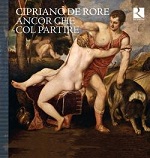 Cipriano
de RORE (1515/16-1565) Ancor che co’l partire receives star
billing on the cover of a Ricercar recording to celebrate the label’s
35th birthday and the composer’s 500th (RIC355
[67:13]) but there is also music by Antonio de CABEZÓN, Giovanni
Battista BOVICELLI, Andrea GABRIELI, Bernard SCHMIDT, Pierre PHALÈSE,
Giovanni BASSANO and Girolamo Della CASA, a veritable Who’s
Who of Flemish, Italian, Spanish and French 16th-century
composers.
Cipriano
de RORE (1515/16-1565) Ancor che co’l partire receives star
billing on the cover of a Ricercar recording to celebrate the label’s
35th birthday and the composer’s 500th (RIC355
[67:13]) but there is also music by Antonio de CABEZÓN, Giovanni
Battista BOVICELLI, Andrea GABRIELI, Bernard SCHMIDT, Pierre PHALÈSE,
Giovanni BASSANO and Girolamo Della CASA, a veritable Who’s
Who of Flemish, Italian, Spanish and French 16th-century
composers.
There’s a mixture of secular and sacred vocal and instrumental works,
including several settings and arrangements of the title work interspersed
throughout the programme. There’s a variety of distinguished performers,
including Cappella Mediterranea, Ensemble Clematis/Stephanie de Failly,
Bernard Foccroulle (organ), L’Achéron/François Joubert-Cailly, Jean
Tubéry (cornet and recorder), Vox Luminis/Lionel Meunier, Doulce Mémoire/Denis
Raisin Dadre and Chœur de Chambre de Namur/Leonardo García Alarcón,
recorded at various dates in 2011 (Doulce Mémoire) and 2014. It’s all
very enjoyable.
Happily both eclassical.com
(mp3, 16- and 24-bit lossless download) and Qobuz
(sample/stream) include the booklet with its detailed notes, texts and
translations. The 24-bit download is especially fine, albeit that it
comes at a price premium ($18.15) over mp3 and 16-bit ($12.10). CD
from Amazon
UK.

Another recording featuring Doulce Mémore and Denis Raisin Dadre comes
as a luxury 2-CD set in a lavishly illustrated hardback book which nevertheless
sells for around the price that you might expect to pay for two ordinary
CDs (Zig-Zag Territoires ZZT357 – CD from
Amazon UK). This time I had the physical product for review. Labelled
François Ier: Musiques d’un Règne, it features
the music composed in the reign of French King Francis the First (r.1515-1547)
and concentrates on that monarch’s famous meeting with the English Henry
VIII at the Field of the Cloth of Gold (1520). The music for the Mass
celebrated on that occasion: compositions by the English Nicholas
LUDFORD and French composers Claudin de SERMISY, Jean MOUTON
and Antoine DIVITIS features on CD1 [69:58], while CD2 [73:05]
features secular works by Pierre CERTON, Pierre ATTAIGNANT and
other contemporaries.
Performances and recording are excellent and the book is a sumptuous
read. All in all this has served to correct the view that I expressed
many years ago in an MA dissertation that none of the French 16th-century
music rivalled the literature of the period – Rabelais, Ronsard and
du Bellay – but we didn’t have such a wealth of recordings then. CD2,
music for François’s court, is especially enlightening in that regard
because, as Dadre states in his detailed notes, the better-known lighter
music of the period which has been recorded by the labels of the Outhere
group and by Harmonia Mundi has been avoided in favour of more profound
material.
On CD1, too, repertoire otherwise recorded has largely been avoided.
Claudin de Sermisy’s Kyrie and Nicholas Ludford’s Gloria,
Sanctus and Benedictus, for example, don’t seem to be
available on any other current recording.
It’s not known what music was performed at that Mass on the Field of
the Cloth of Gold but we do know which items were by English composers
and which by French and that the French custom of singing O Salutaris
Hostia at the Elevation of the Host was observed. Oddly, O Salutaris
is here interpolated between the Sanctus and Benedictus,
so well before the moment of the elevation. That apart and the slightly
annoying spoken commentary at various points – “this is what happened
next” – I enjoyed both CDs and the book is a real eye- and brain-fest.
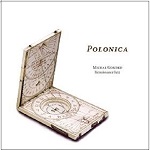 Ramée
RAM1406 is entitled Polonica: Lute music with Polish connections
around 1600. Michal Gondko plays a 7-course renaissance lute.
Some of the music is identified in the sources, which Gondko has edited
for this recording, as AD, A[lbertus] D[lugoraj] (1557/8-after 1619),
but much of it is anonymous. Most of it is quiet and contemplative,
even those items listed as Polnischer Tantz (Polish dance), which
means that my one reservation is that the whole album is rather same-y.
Ramée
RAM1406 is entitled Polonica: Lute music with Polish connections
around 1600. Michal Gondko plays a 7-course renaissance lute.
Some of the music is identified in the sources, which Gondko has edited
for this recording, as AD, A[lbertus] D[lugoraj] (1557/8-after 1619),
but much of it is anonymous. Most of it is quiet and contemplative,
even those items listed as Polnischer Tantz (Polish dance), which
means that my one reservation is that the whole album is rather same-y.
The CD is due for release by Amazon
UK on 18 May 2015. Stream/sample, with booklet from Qobuz.
Of several earlier recordings on Outhere on which Gondko has featured
with distinction as editor and performer, you should try the Ricercar
2-CD set of the music of Ciconia (RIC316: Recording of the Month
– review).
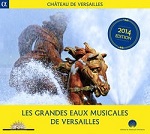 Somewhat
confusingly, there are a number of albums entitled Les Grandes
Eaux Musicales de Versailles – I reviewed
one directed by Christophe Rousset for Naïve some time ago. There even
are several on the Alpha label: one from 2013, reissued in 2014 with
a new sticker (Alpha 956 [75:07] – sample/stream/download from
Qobuz,
download from eclassical.com,
both with pdf booklet) and a new one for April 2015 (Alpha 959
[66:36] – CD from Amazon
UK. Sample/stream from Qobuz).
I expect the 2015 version to be available from eclassical.com shortly.
Somewhat
confusingly, there are a number of albums entitled Les Grandes
Eaux Musicales de Versailles – I reviewed
one directed by Christophe Rousset for Naïve some time ago. There even
are several on the Alpha label: one from 2013, reissued in 2014 with
a new sticker (Alpha 956 [75:07] – sample/stream/download from
Qobuz,
download from eclassical.com,
both with pdf booklet) and a new one for April 2015 (Alpha 959
[66:36] – CD from Amazon
UK. Sample/stream from Qobuz).
I expect the 2015 version to be available from eclassical.com shortly.
Disappointingly, both are samplers carved from earlier Alpha recordings:
the 2014 edition ranges from MOULINIÉ (from Alpha 005)
via LULLY (Alpha 016 and 074) and RAMEAU (Alpha 142 and
951) to CORRETTE (Alpha 152).
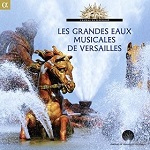 The
2015 recording contains music by CHARPENTIER (from Alpha 952),
LULLY (Alpha 074 and Alpha 016), ROYER (Alpha 953), LECLAIR
(Alpha 960), CAMPRA (Alpha 958) and RAMEAU (Alpha 951).
The performances, from the likes of Le Poème Harmonique, Café Zimmermann
and Capriccio Stravagante, are all first-rate and both albums would
make good introductions to French baroque music, but these are not inexpensive
samplers, as you might expect, and the original complete recordings
are even more attractive.
The
2015 recording contains music by CHARPENTIER (from Alpha 952),
LULLY (Alpha 074 and Alpha 016), ROYER (Alpha 953), LECLAIR
(Alpha 960), CAMPRA (Alpha 958) and RAMEAU (Alpha 951).
The performances, from the likes of Le Poème Harmonique, Café Zimmermann
and Capriccio Stravagante, are all first-rate and both albums would
make good introductions to French baroque music, but these are not inexpensive
samplers, as you might expect, and the original complete recordings
are even more attractive.
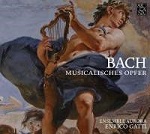 There
are almost as many ways to perform Johann Sebastian BACH (1685-1750)
Musikalisches Opfer (Musical Offering, BWV1079) as there
are recordings of it, some sparse, some more filled out, so I was interested
to see how Enrico Gatti and Ensemble Aurora would handle it (Arcana
A384) [62:20] – sample/stream/download from Qobuz;
CD from Amazon
UK). They opt for the sparse treatment, with just four instruments,
violin, flute, cello and harpsichord. Many will prefer this, and it’s
very good of its kind, but I find it a little cerebral compared with
my first encounter with this great work on a Supraphon recording where
it was given a much fuller treatment by Milan Munclinger and Ars Rediviva
(SUA10072). This was once available on CD (SU0087-2) and it makes
a reasonable compromise between the sparsity of Ensemble Aurora and
the over-heavy Bach interpretations of Karl Münchinger and his Stuttgart
Chamber Orchestra. Try the latter on Naxos Classical Archives from
Qobuz:
it’s actually much better than I recall and the 1955 recording still
sounds good.
There
are almost as many ways to perform Johann Sebastian BACH (1685-1750)
Musikalisches Opfer (Musical Offering, BWV1079) as there
are recordings of it, some sparse, some more filled out, so I was interested
to see how Enrico Gatti and Ensemble Aurora would handle it (Arcana
A384) [62:20] – sample/stream/download from Qobuz;
CD from Amazon
UK). They opt for the sparse treatment, with just four instruments,
violin, flute, cello and harpsichord. Many will prefer this, and it’s
very good of its kind, but I find it a little cerebral compared with
my first encounter with this great work on a Supraphon recording where
it was given a much fuller treatment by Milan Munclinger and Ars Rediviva
(SUA10072). This was once available on CD (SU0087-2) and it makes
a reasonable compromise between the sparsity of Ensemble Aurora and
the over-heavy Bach interpretations of Karl Münchinger and his Stuttgart
Chamber Orchestra. Try the latter on Naxos Classical Archives from
Qobuz:
it’s actually much better than I recall and the 1955 recording still
sounds good.
I listened to the Munclinger again from Qobuz
and I find myself, against the odds, still liking his performance after
all these years despite all the changes which have taken place in the
approach to Bach. I also still like another older recording with a
slightly fuller line-up, from the Academy of St Martin in the Fields
and Neville Marriner, still sounding well on a budget-price twofer (Decca
Duo 4425562, with Art of Fugue). Another middle-way recording,
which I know several of my colleagues like, comes from an ensemble led
by Michael Behringer on Hänssler 92.133 – see 5-star review:
download from eclassical.com
(mp3 and lossless, NO booklet).
For Nicholas Jackson’s attractive recording with his Concertante of
London (Somm SOMMCD077) please see my review.
The recording by Ensemble Sonnerie which I recommended then (Virgin,
now Erato) is download only – from 7digital.com,
mp3 and lossless, or stream from Qobuz.
Though the Offering used to be thought enough for one LP, it’s
rather short value on CD, so the Arcana recording adds the Sonata in
G for violin and continuo, BWV1021, and the Trio Sonata in G, BWV1038.
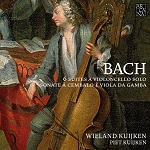 I’ve
never quite grown to love, as opposed to admiring, BACH’s unaccompanied
Cello Suites, BWV1007-1012. The latest recording – actually
made in 2001-2002 and first released by Arcana, briefly, in 2004 – comes
from Wieland Kuijken (cello, violoncello piccolo in BWV1012, and bass
viol in BWV1027-1029) and he is also accompanied by his son, Piet Kuijken
(harpsichord), in the three sonatas for harpsichord and viola da gamba,
BWV1027-9 (Arcana A383 [74:00 + 61:00 + 79:00] - from Amazon
UK). Generosity with repeats means that the performances spill
over the usual 2-disc format but the three CDs are on sale for not much
more than the normal price of one.
I’ve
never quite grown to love, as opposed to admiring, BACH’s unaccompanied
Cello Suites, BWV1007-1012. The latest recording – actually
made in 2001-2002 and first released by Arcana, briefly, in 2004 – comes
from Wieland Kuijken (cello, violoncello piccolo in BWV1012, and bass
viol in BWV1027-1029) and he is also accompanied by his son, Piet Kuijken
(harpsichord), in the three sonatas for harpsichord and viola da gamba,
BWV1027-9 (Arcana A383 [74:00 + 61:00 + 79:00] - from Amazon
UK). Generosity with repeats means that the performances spill
over the usual 2-disc format but the three CDs are on sale for not much
more than the normal price of one.
These are fine performances, well recorded, but they still leave me
admiring the music intellectually rather than loving it. The situation
remains as I summed it up at the end of my review of the Cello Suites
performed by Angela East on Red Priest RP006 – review:
Steven Isserlis on Hyperion (CDA67541/2) makes the safest recommendation
at full price, with Paul Tortelier 1961 (EMI, due for reissue on Warner
2435628782), Pierre Fournier (DG Archiv 4497112 or 4776724)
and Mstislav Rostropovich (EMI 5181582) vying for the mid-price
honours or Paul Tortelier 1983 on budget-price CFP (download only: £5.99
from
sainsburysentertainment.co.uk
).
I enjoyed the performances of the accompanied sonatas more. These have
been recorded more often than I thought, notably but less authentically
by Daniel Müller-Schott (cello) and Angela Hewitt (piano) (Orfeo C693071A).
Other performers employ the baroque cello, the viola bastarda and the
viola da gamba. Dominy Clements liked a Zig-Zag Territoires recording
using the gamba (ZZT340 – review)
and Johan van Veen praised another with that instrument on another Outhere
label (Alpha 161 – review
). Now there are three Outhere recordings to choose from, with the
added advantage that the well-performed and well-recorded Arcana comes
as part of the very well-filled third CD in an inexpensive set.
I had to resist the download from eclassical.com; though it comes in
better quality than the 192kb/s press preview from Outhere, it would
be unethical to download something which I can’t recommend because it
costs a good deal more than the equivalent CDs. For once their per-second
charging policy lets them down. They do, however, have Alpha 161
in mp3 and 16-bit sound, complete with pdf booklet – here
– and that I can endorse.
If you just want Wieland Kuijken in the three accompanied sonatas, his
1978 recording for Deutsche Harmonia Mundi, with Gustav Leonhardt, still
my go-to version in its incarnation on an EMI CD, remains available
to stream/download from Qobuz.
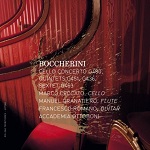
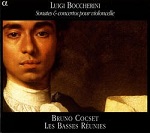 Luigi
BOCCHERINI (1743-1805) is best known for works containing the cello
and the guitar. On Zig-Zag Territoires ZZT360 [63:53] the two
instruments are combined in performances of the Cello Concerto No.7
in G, G480, the Quintets, No.7, G451, and No.6, G436, and the
Sextet (Divertimento), G463, performed by Marco Ceccato (cello)
with Manuel Granatiero (flute), Francesco Romano (guitar) and Accademia
Ottoboni.
Luigi
BOCCHERINI (1743-1805) is best known for works containing the cello
and the guitar. On Zig-Zag Territoires ZZT360 [63:53] the two
instruments are combined in performances of the Cello Concerto No.7
in G, G480, the Quintets, No.7, G451, and No.6, G436, and the
Sextet (Divertimento), G463, performed by Marco Ceccato (cello)
with Manuel Granatiero (flute), Francesco Romano (guitar) and Accademia
Ottoboni.
There are several rival recordings of G480, including a budget-price
Warner/Telefunken Das Alte Werk recording with three other Boccherini
cello concertos (2564698530: Jaap Schröder; Concert Amsterdam)
and another recording from the Outhere stable of Cello Concertos Nos.
2 and 7 and three cello sonatas (Alpha 084)* but the new Zig-Zag
performances are attractive and no other recording is identically coupled.
Even in the 192kb/s press preview the sound is good.
This inconsequential but enjoyable album is due for release on 18 May
2015 – from Amazon
UK.
* On another Outhere label, Alpha 084, Bruno Cocset offers excellent
performances of the two concertos with a similarly slimmed-down ensemble,
Les Basses Reunies – download from eclassical.com
(mp3 and lossless, NO booklet). CD from Amazon
UK and Amazon
US.
Don’t overlook the very enjoyable recording of three Boccherini cello
sonatas, coupled with rarities from Giovanni Battista Cirri which I
reviewed recently (Deutsche Harmonia Mundi 88875013182: Alison
McGilvray, etc. – review).
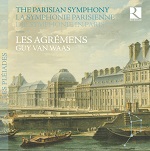 On
a set entitled The Parisian Symphony, Les Agrémens conducted
by Guy van Waas perform music by Andre-Modeste GRETRY (1741-1813),
François-Joseph GOSSEC (1734-1829), Johann STAMITZ (1717-1757),
Joseph Martin KRAUS (1756-1792), Dieudonné-Pascal PIELTAIN (1754-1833),
Antoine-Frédéric GRESNICK (1755-1799), Ludwig August LEBRUN (1752-1790),
Joseph HAYDN (1732-1809) – Symphony No.45, ‘Farewell’ and
Nos. 82, 85, ‘La Reine’ and 86, from his Paris set, plus the Trumpet
Concerto, Ludwig van BEETHOVEN (1770-1827) – Symphony No.2,
Antonio SALIERI (1750-1825), Rodolphe KREUTZER (1766-1831), Christoph
Willibald GLUCK (1714-1787), Jean-Baptiste LEMOYNE (1751-1796), Johann
Christian BACH (1735-1782), Étienne-Nicolas MÉHUL (1763-1817), Louis-Ferdinand
HÉROLD (1791-1833) and Gaspare SPONTINI (1774-1851) (Ricercar
RIC357, 7 CDs). The recordings were made between 2002 and 2014
and they come with a very detailed set of notes.
On
a set entitled The Parisian Symphony, Les Agrémens conducted
by Guy van Waas perform music by Andre-Modeste GRETRY (1741-1813),
François-Joseph GOSSEC (1734-1829), Johann STAMITZ (1717-1757),
Joseph Martin KRAUS (1756-1792), Dieudonné-Pascal PIELTAIN (1754-1833),
Antoine-Frédéric GRESNICK (1755-1799), Ludwig August LEBRUN (1752-1790),
Joseph HAYDN (1732-1809) – Symphony No.45, ‘Farewell’ and
Nos. 82, 85, ‘La Reine’ and 86, from his Paris set, plus the Trumpet
Concerto, Ludwig van BEETHOVEN (1770-1827) – Symphony No.2,
Antonio SALIERI (1750-1825), Rodolphe KREUTZER (1766-1831), Christoph
Willibald GLUCK (1714-1787), Jean-Baptiste LEMOYNE (1751-1796), Johann
Christian BACH (1735-1782), Étienne-Nicolas MÉHUL (1763-1817), Louis-Ferdinand
HÉROLD (1791-1833) and Gaspare SPONTINI (1774-1851) (Ricercar
RIC357, 7 CDs). The recordings were made between 2002 and 2014
and they come with a very detailed set of notes.
A word of warning: most, if not all of these very enjoyable recordings
have been available separately: the Haydn symphonies 45 and 85, for
example, with Kraus Symphony in D, as Haydn à Paris (RIC277
–
DL News February 2012/2), while Nos. 82 and 86 appeared with Lebrun
Oboe Concerto No.5 on RIC309. If, however, you didn’t obtain
any of them separately, the price, a little over the cost of two CDs
for the set, is attractive – due for release in the UK in May 2015 by
Amazon
UK.
Most of the music on the earlier CDs in this set doesn’t conform to
what we understand as a symphony, though some of it is called sinfonia.
Some items are primarily vocal, but all have been selected to demonstrate
the development of orchestral music, alone or as accompaniment, in the
pre-classical and early classical period. As you might expect, Haydn’s
four symphonies are the highlight of the set: three were actually composed
for Paris and there is some evidence that No.45, the ‘Farewell’, though
composed for a dateable event at Esterháza in 1772, was also performed
in Paris. There even seems to be an echo of No.45 in the first movement
of No.85.
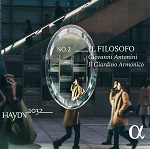 Giovanni
Antonini and Il Giardino Armonico, better known for performances of
Italian baroque music, have recently turned their attention to Joseph
HAYDN (1732-1809) for a project named Haydn 2032. I really
do hope that it’s complete long before Haydn’s tercentenary in that
year, as I certainly won’t be around then. The second instalment, on
Alpha 671, is entitled Il Filosofo because it contains
the symphony No.22, nicknamed Der Philosoph, along with Nos.
46 and 47 and a Sinfonia in F by Wilhelm Friedemann BACH (1710-1784),
included here simply because he and Haydn sought to be original, though
in different ways. No matter: it’s an enjoyable work.
Giovanni
Antonini and Il Giardino Armonico, better known for performances of
Italian baroque music, have recently turned their attention to Joseph
HAYDN (1732-1809) for a project named Haydn 2032. I really
do hope that it’s complete long before Haydn’s tercentenary in that
year, as I certainly won’t be around then. The second instalment, on
Alpha 671, is entitled Il Filosofo because it contains
the symphony No.22, nicknamed Der Philosoph, along with Nos.
46 and 47 and a Sinfonia in F by Wilhelm Friedemann BACH (1710-1784),
included here simply because he and Haydn sought to be original, though
in different ways. No matter: it’s an enjoyable work.
No.46 and No.47 date from the period of the Sturm und Drang symphonies
but they don’t share the dramatic outpourings of some of the symphonies
of that time, including No.49, la Passione, included on Volume
1 (Alpha 670). Indeed, I did just wonder if the performances
were not a little too civilised, in contrast to Antonini’s reputation
for fiery performances, though I liked these performances overall almost
as much as those on Volume 1 – DL
News 2014/13. The CDs are due for release on 18 May 2015 from Amazon
UK.
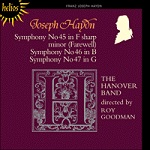 Bargain
lovers should note that Symphonies 45-47 are available on the Hyperion
Helios label in performances from Roy Goodman and the Hanover Band,
also first-rate period specialists. The CD (CDH55118) is available
only from the Archive Service but the download, in mp3 or lossless,
costs just £5.99 from hyperion-records.co.uk,
with pdf booklet. Nos. 22-25 are on CDH55116 – from hyperion-records.co.uk,
with pdf booklet. It’s a great shame that this fine series was never
completed and even more of a shame that these CDs have been in so little
demand, even at budget price, that they have drifted into the Archive
Service.
Bargain
lovers should note that Symphonies 45-47 are available on the Hyperion
Helios label in performances from Roy Goodman and the Hanover Band,
also first-rate period specialists. The CD (CDH55118) is available
only from the Archive Service but the download, in mp3 or lossless,
costs just £5.99 from hyperion-records.co.uk,
with pdf booklet. Nos. 22-25 are on CDH55116 – from hyperion-records.co.uk,
with pdf booklet. It’s a great shame that this fine series was never
completed and even more of a shame that these CDs have been in so little
demand, even at budget price, that they have drifted into the Archive
Service.
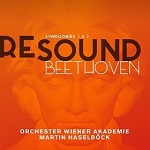 Chamber-orchestra-scale
recordings of the symphonies of Ludwig van BEETHOVEN (1770-1827)
are not new: I remember hearing a most impressive broadcast of the Seventh
more than 50 years ago which cast new light on a work which I had known
until then from Bruno Walter’s mono LP with the New York Philharmonic
– still worth hearing if you can track it down.
Chamber-orchestra-scale
recordings of the symphonies of Ludwig van BEETHOVEN (1770-1827)
are not new: I remember hearing a most impressive broadcast of the Seventh
more than 50 years ago which cast new light on a work which I had known
until then from Bruno Walter’s mono LP with the New York Philharmonic
– still worth hearing if you can track it down.
Now as part of the Re-sound Project Alpha have recorded Martin Haselböck
with the Wiener Akademie in Symphony No.1 in C, Op.21 [25:28]
and Symphony No.2 in D, Op.36 [31:16], two early works which
lend themselves well to the scaled-down treatment. (Alpha 470
[56:44] – from Amazon
UK). The recordings, the first of a planned series, were made with
period instruments in venues which have changed little since Beethoven’s
day – in this case, Landhaussaal Palace, Lower Austria, 7-9 December
2014.
I enjoyed these light and airy performances, which nevertheless are
not lacking in power, and they sound fine, as streamed from Qobuz,
also available for 16- and 24-bit download, with informat ive pdf booklet.
The performances may not be as special as the publicity material might
lead you to expect but well worth having if you want these two symphonies
together – not as common a coupling as you might imagine: the chief
competition comes from Neville Marriner with the ASMF on PentaTone,
a Philips Quad recording re-mastered for SACD (PTC5186118).
I haven’t been able to compare that recording but, though it has been
well reviewed and I like Marriner’s work, I can’t imagine that it outshines
the new recording except for those who must have surround SACD.
Otherwise if you are prepared to go the whole hog in period style, Emmanuel
Krivine’s set of all nine symphonies on Naïve V5258 – Download
News July 2011/2 – remains available for about the price of two
CDs or downloads – try or download them from Qobuz.
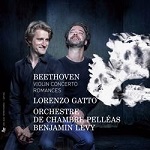 There
is a middle way between the use of period instruments and modern performance
practice and that’s what Zig-Zag Territoires claim for their recording
of the BEETHOVEN Violin Concerto and two Romances for
violin and orchestra, namely the use of period-inspired practice with
modern instruments. Certainly the performances have the same clean-edged
sound as we have come to expect from the likes of the Orchestre Révolutionnaire
et Romantique without any of the issues that occasionally arise from
playing original instruments – less a problem now than when the HIP
movement began.
There
is a middle way between the use of period instruments and modern performance
practice and that’s what Zig-Zag Territoires claim for their recording
of the BEETHOVEN Violin Concerto and two Romances for
violin and orchestra, namely the use of period-inspired practice with
modern instruments. Certainly the performances have the same clean-edged
sound as we have come to expect from the likes of the Orchestre Révolutionnaire
et Romantique without any of the issues that occasionally arise from
playing original instruments – less a problem now than when the HIP
movement began.
The opening performance of the overture to The Creatures of Prometheus
by Orchestre de Chambre Pelléas/Benjamin Lévy gets the recording off
to a good start and Lorenzo Gatto proves an able, clear-voiced soloist.
His tone is perhaps a little thinner than that of the great interpreters
of this concerto – 12 listed by MWI
Recommends – but some may find that more to their liking. On
the whole, however, nothing about this likeable new recording is special
enough to warrant a place at the top table. (ZZT354 [63:09]
– from eclassical.co.uk
or theclassicalshop.net,
both mp3, 16- and 24-bit lossless with pdf booklet). CD from Amazon
UK and Amazon
US.
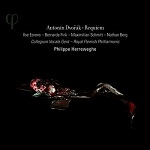 Philippe
Herreweghe has recorded Antonín DVOŘÁK(1841-1904)
Requiem, Op.89, with Ilse Eerens (soprano), Bernarda Fink
(alto), Maximilian Schmitt (tenor), Nathan Berg (bass), Collegium Vocale
Gent and the Royal Flemish Philharmonic (PHI LPH016, 2 CDs for
a little more than the price of one [50:49 + 42:33]). It’s not a work
that I know well: it doesn’t match the heights of the Mozart or Verdi
or the tranquillity of the Fauré or Duruflé, but I enjoyed hearing this
recent recording. CDs from Amazon
UK and
Amazon US; sample/stream/download from Qobuz.
Philippe
Herreweghe has recorded Antonín DVOŘÁK(1841-1904)
Requiem, Op.89, with Ilse Eerens (soprano), Bernarda Fink
(alto), Maximilian Schmitt (tenor), Nathan Berg (bass), Collegium Vocale
Gent and the Royal Flemish Philharmonic (PHI LPH016, 2 CDs for
a little more than the price of one [50:49 + 42:33]). It’s not a work
that I know well: it doesn’t match the heights of the Mozart or Verdi
or the tranquillity of the Fauré or Duruflé, but I enjoyed hearing this
recent recording. CDs from Amazon
UK and
Amazon US; sample/stream/download from Qobuz.
By comparison Karel Ančerl
with a top line-up of soloists and the Czech Philharmonic sounds more
dramatic where it matters – comparing the confutatis maledictis,
for example – but though the recording has worn well, it cannot match
the new PHI sonically. (DG 4530732, 2 budget-price CDs with
six of the Biblical Songs – review
and review
of alternative release). The recent Naxos recording, directed by Antoni
Wit, is available in 24-bit download form from eclassical.com: it’s
rather pricey at $26.44, but it sounds very well ( 8.572874/5
– review).
16-bit and mp3 are available for $17.63, which works out less than Naxos’s
own COL.HD:LL
(£15.99). Both come with pdf booklet but the CDs are less expensive
than either – typically around £11. CDs from Amazon
UK –
Amazon US – Arkivmusic.
Whichever way you obtain it, the Wit recording seems to me the best
compromise in terms of performance and recording.














